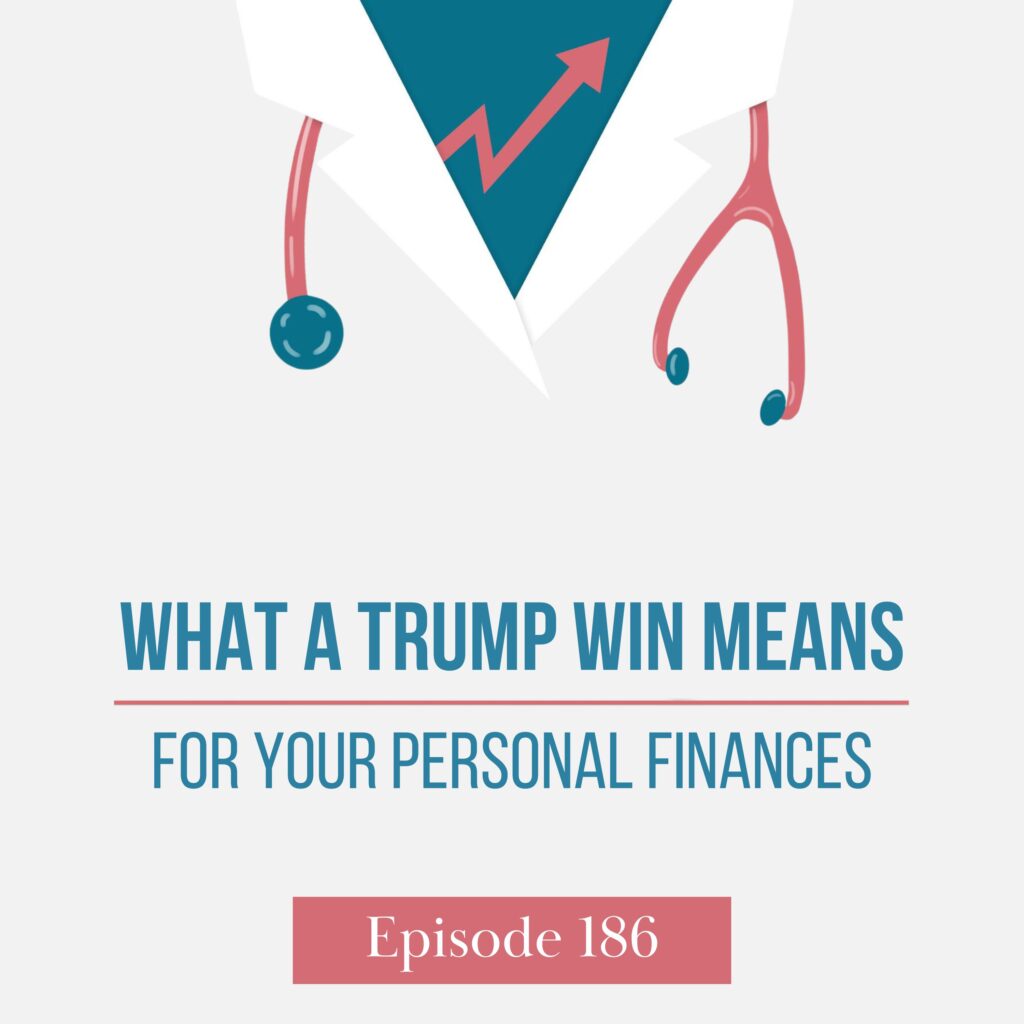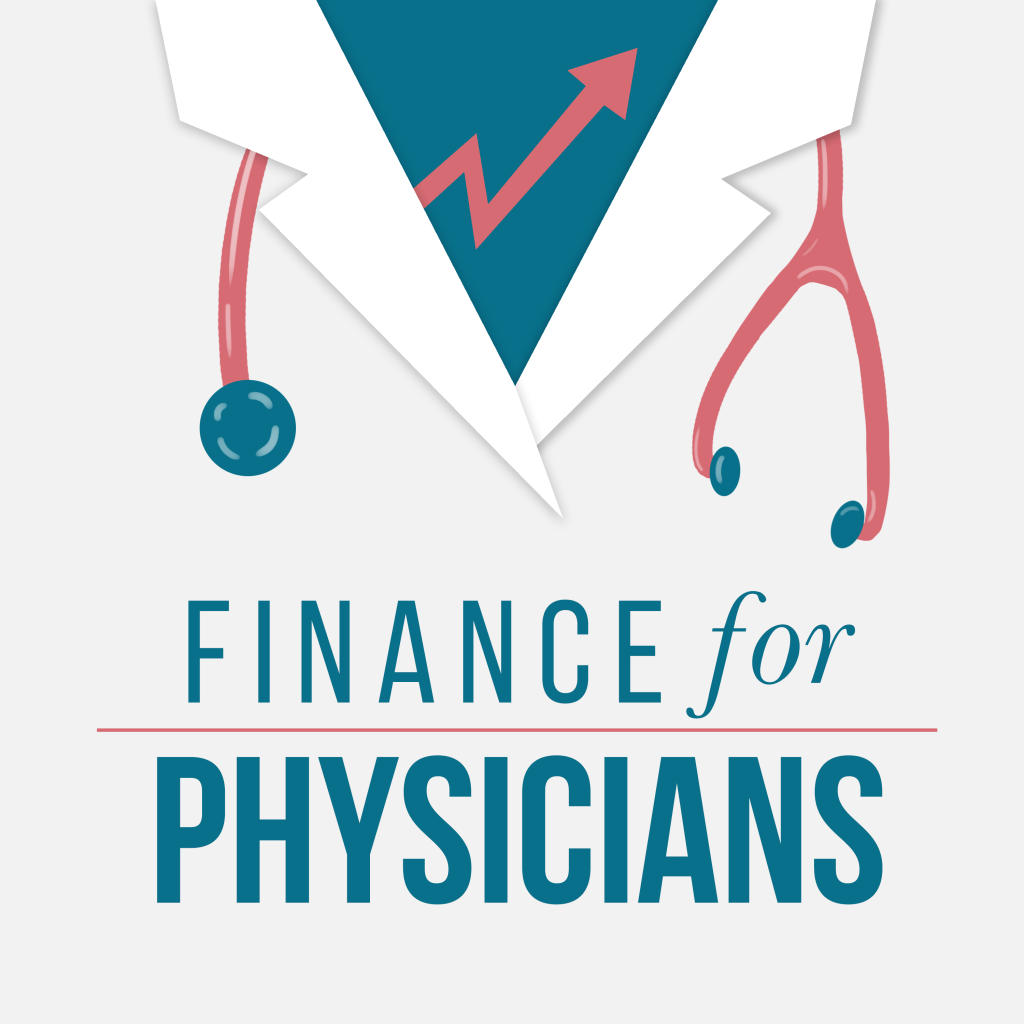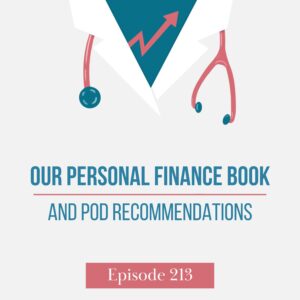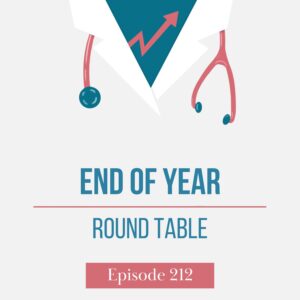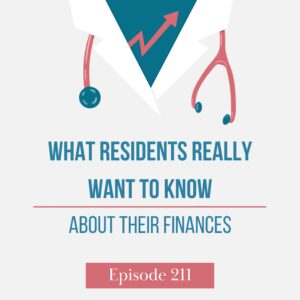You’ll learn how to maintain a long-term perspective, avoid impulsive decisions, and understand the potential impact of upcoming tax changes.
- Connect with me on my LinkedIn
- Contact Finance for Physicians
- Finance for Physicians
- To schedule a call with one of our awesome planners, book HERE.
Full Episode Transcript:
Daniel Wrenne: Why am I going to pay a tip in a bookstore or something? It’s like–
Jackie Griggs: You handed me a plastic water bottle.
Daniel Wrenne: Yeah, like, “No, I’m not tipping you.” But it’s like you got to push three buttons with the person watching you in order to not pay a tip. So sometimes you’re just like, “All right, I’ll click the button and pay the tip.” I wonder if they knew this was coming. It’s almost like they knew it was coming. They’re like, “We got to build in the tips for this no tax on tips thing.”
Jackie Griggs: Yeah, I hope everyone’s prepared for when we hang up our zoom call and then it pops up and it’s not like, “How is your audio?” It’s like, “How much do you want to tip your financial planners?”
Daniel Wrenne: Right. We are accepting tips now.
Welcome to Finance for Physicians, the show where we help physicians like you use money as a tool to live a great life. I’m your host, Daniel Wrenne, and I’ve spent the last decade advising physicians on their personal finances with the mission to help them understand that taking control of their finances now means creating a future where they can practice medicine where, when, and how long they want to.
Daniel Wrenne: Jackie, welcome to the podcast for the first time ever.
Jackie Griggs: Hi, Daniel. Thanks for having me. Long time listener, first-time participant.
Daniel Wrenne: Nice. Yeah. I thought that I had you on before, but it’s–so Jackie’s been with us. She’s one of our exceptional financial planners for quite a while now, and it’s been a long time coming. I’m glad we’ve gotten, we’ve made the time to get together and we’re talking about such an exciting topic too. We’re going to talk about politics.
Jackie Griggs: Yes, everyone’s favorite, really.
Daniel Wrenne: Yeah, I mean, we’re not going to get into the politics, but we will talk about, we’re going to talk about hot topic, definitely now, this time of year, as we’re recording, this is December of 2024.
So, we’re getting into the end of the year, an election has already happened, and we have kind of a change in leadership, and there’s been all kinds of talk about big-time changes, one way or the other. And so as a result, it’s natural for, I’m sure a lot of you guys listening and a lot of the people we work with, it’s natural for people to be having a little bit of uncertainty or a little concerned or worry around like, “What’s going to change?”
“Are my investments going to tank to nothing,” or is inflation, whatever, how’s all this? ‘Cause there’s a lot of big stuff being thrown around. So we’re going to kind of dip our toe into the water and some of the big stuff you’ve probably heard about, and hopefully some of the things you’ve been thinking about as far as like how that might impact your situation. So I’m excited.
Jackie Griggs: Yeah. As am I, let’s get into it.
Daniel Wrenne: Yeah. I think maybe a good starting point would be to talk about the tax stuff because it’s actually, I wouldn’t say straightforward, but probably a little more status quo because–so the current tax laws that we’re operating under right now is the, what was it? 2018 when that was passed, Jackie? I think it was 2018.
Jackie Griggs: 2018, yeah, somewhere in that—
Daniel Wrenne: Tax cut and job. Is it TCGA?
Jackie Griggs: The TCJA.
Daniel Wrenne: Tax Cuts and Jobs Act.
Jackie Griggs: Yes.
Daniel Wrenne: So that was a Trump thing. It was 2017, 2018. And there was actually a huge tax change. They added a lot of really unique things. Like they added this QBI thing for business owners, a huge deal.
If you don’t know about that and you’re a business owner, read about the QBI. We’ll definitely cover that in a future show if you want. And then the SALT tax, we’ll talk about that in a minute. This was this cap that they implemented in that new tax law where it basically limited your ability to deduct certain things.
That was another thing. And they also kind of played with the tax brackets some like they lowered them in general. And so the unique thing about that tax law is it was set to expire in what?
Jackie Griggs: 2026. Sunsetting and returning more back to the previous laws that we’d had before.
Daniel Wrenne: Right, which were on average for the type of families we work with worse. The average family I work with paid less tax under the Tax Cuts and Jobs Act than they were paying before, but generally speaking, but, and I think they did that. Do you know, Jackie, did they, I think they did that so that they could, I think they had to have less votes if they did it where it’s sunset?
Jackie Griggs: I believe so, but you know, we’re calling back many years now and I don’t feel 100 percent confident on that exact hurdle per se.
Daniel Wrenne: Right. So anyway, the big thing that was kind of on the radar was that thing’s about to go away and in 2026 and Kamala Harris was definitely like, “It’s not coming back.” Like it was, I think she was pretty clear in that she was not going to extend it again. And Trump was very much so like saying he would extend or make it permanent, I guess.
Jackie Griggs: And so now that’s suddenly back on the table for this administration.
Daniel Wrenne: Right, so odds are, I would say that of all the tax things we’ll talk about, I think that’s probably the most, if I had to bet, the most likely thing to happen is that that gets extended or maybe made permanent. I mean, nothing’s permanent, but like.
Jackie Griggs: Right, but at the very least another extension instead of that 2026 sunset that has been currently written and planned for, but that now probably going to be keeping that going forward as well as some tweaks that have even been discussed from this incoming administration for things that they will potentially change with it from last time.
Daniel Wrenne: And there was also another big part of the TCJA tax law that was potentially going to sunset. That was the estate tax threshold or taxable estate threshold. That’s the number, the amount of net worth you have to have in order to start getting taxed as an estate.
Jackie Griggs: Right.
Daniel Wrenne: Like a taxable estate, which is a huge tax. And so that number was set to go way down. Well, I think it was like 7 million or something.
Jackie Griggs: It’s definitely a significant difference from what it was under TCJA.
Daniel Wrenne: Right. And whereas now it’s what, like is it 14 million per person?
Jackie Griggs: I believe so.
Daniel Wrenne: So like a couple is, you know, it’s a high number to where it’s very less, very much less people are affected by it. So anyway that’s, for most people listening, I think that’s generally good news. The tax scheme is probably going to continue on how it has been. But what about all this other stuff? There’s been a lot of talk. So what are some of the things Trump’s talked a lot, but what are some of the things we want to talk about?
No tax on tips. We’re going to start, I think everybody’s going to start getting paid tips all of a sudden.
Jackie Griggs: I know. I think I’m actually going to be bringing that to you and asking if I can be compensated as tips instead of salary for now.
Daniel Wrenne: We may start accepting tips. I don’t know. It’s funny. I was just, you know how they, everybody, I guess it was a COVID thing, magically started building in tips into their processing systems, like even for non-services, it’s like, “Why am I going to pay a tip in a bookstore or something?” It’s like–
Jackie Griggs: You handed me a plastic water bottle.
Daniel Wrenne: Yeah. Like, “No, I’m not tipping you.” But it’s like you got to push three buttons with the person watching you in order to not pay a tip.
So sometimes you’re just like, “All right, I’ll click the button and pay the tip.” I wonder if they knew this was coming. It’s almost like they knew it was coming. They’re like, “We got to build in the tips for this no tax on tips thing.”
Jackie Griggs: Yeah. I hope everyone’s prepared for when we hang up our Zoom call and then it pops up and it’s not like, “How was your audio?” It’s like, “How much do you want to tip your financial planner today?”
Daniel Wrenne: “We are accepting tips now.” I don’t know, that one will be a little harder because that’s going to have to, like I think that will have to be like a congress thing. It would be a new change. And I guess they could add that on to the Tax Cuts and Jobs Act deal.
Jackie Griggs: Yeah, I know that’s been discussed, but not sure entirely how realistic that is to make that come to fruition for people.
Daniel Wrenne: And I don’t know how many physicians would be affected by it. One thing I would say is this is always how it goes almost with tax laws. I wouldn’t, I would be, as soon as they pass it, there will be like creative ways to like work around it. So people are going to be like, “Well, how could I start earning tips?”
Jackie Griggs: “Would you like to tip your surgeon?”
Daniel Wrenne: Right. You’ll see like a sign in the surgery office, “Accepting tips. And we’ve lowered our pricing too.” And you know–
Jackie Griggs: Yeah, there will, if that does end up coming to fruition, I think there will be some creative ways we see pricing and compensation change in a variety of businesses going forward.
Daniel Wrenne: Yeah. Now the other big thing we’re going to talk about that I think would affect a lot of you guys, especially if you’re on the older end of the spectrum, is the social security thing. So
Jackie Griggs: we are doing away with the taxation of social security benefits. That could mean a lot, as you mentioned, especially for people who are either a little closer to retirement or already in retirement, that could make a significant difference in what their monthly annual cash flow looks like for them.
Daniel Wrenne: Yeah. And it could be pretty substantial if you’re in a high tax bracket. So how it works now is I think it’s like a $25,000 threshold or something. It’s like when you exceed a certain threshold, they start to tax your social security income, but not all of it. Like they kind of like partially tax it. I think it’s like the 85 percent or something, along those lines of basically, if you’re in a high income, most, pretty much all physicians would be set to pay tax on most of their social security income.
Like generally that’s how it shakes out. And so if you’re in the, if you’re getting $4,000 a month or we’ll say $50,000 a year of social security income and you’re paying tax on $30,000 of it and you’re in a high tax, 50 percent tax bracket, like $30,000, 50 percent tax bracket. That’s a lot of, that’s $15,000 of tax potentially swing.
So that’s a big one. Now, if you’re younger, I don’t know, we got bigger problems with social security.
Jackie Griggs: Well, so that’s actually what I was going to bring up is you said this may have a big impact if we’re in retirement or close to it, but some of the projections with the change, that loss of revenue from no longer taxing those benefits, I have it up right now on one of my other screens. It’s projected to increase the shortfall here, the 75-year shortfall that they project out for social security funding by 25%. So there are some potential longer-term spillover effects for our younger working year-type clients.
Daniel Wrenne: In other words, by not taxing it, it’s going to make it worse.
Jackie Griggs: Correct. Yeah. Because that’s no longer than pouring back into what we have available to pay out those benefits.
Daniel Wrenne: I didn’t know that they were, I guess I didn’t know one way or the other. I was assuming they were not using the Social Security tax to put it in the Social Security pool. It would make sense for them to do that, but like knowing the government, I would have thought they just throw it in the other pool of money.
And in that case, it doesn’t make a big deal, but that’s–either way that’s a separate problem. Like the last time I looked at it, it was like Social Security is going to be required to make changes in like 2032 or something like that.
Jackie Griggs: Yeah. So, the current insolvency date that they’re projecting is 2032 for Social Security and 2030 for Medicare specifically. And with these proposed changes of no longer taxing that income, that is going to be one year earlier for Social Security and six years earlier for Medicare. But again, that’s all based on budgetary projections here. And if we’re changing large aspects of tax policy overall, maybe they find some ways to try and plug up those.
Daniel Wrenne: Yeah, I have no, I wonder how they calculated it for Medicare because that’s like different and different. I guess they probably just paraded it or I don’t know. Anyway, I wouldn’t trust government projections either. So that’s another factor.
Jackie Griggs: Should we start releasing our own projections?
Daniel Wrenne: Yeah, we should start–no, what we should do is we should start reminding people of what the government projections were like five years ago to show how bearable they are.
Jackie Griggs: Well, I think that’s a big part of some of these election year things is we don’t want anything, any decisions or changes to be driven by fear. So that actually would be very helpful to say, “Yeah, here’s what the projections used to say and here’s what the situation is now. So let’s maybe take it all with a grain of salt.”
Daniel Wrenne: Yeah, they’re pretty much always wrong. And no one ever talks about the old projections. They’re just like, “What’s the updated projection?” So maybe we should be like, “Well, how often have they been wrong?” And it’s 99 percent of the time. So projections are meaningless in that case. Yeah, so potentially no tax on social security.
We’ll see how that shakes out. That could be a big deal. But there’s a lot of problems with social security. I guess a takeaway for that is we always advise our clients just not to even account for social security to be safe, especially if you’re younger. It’s like let’s just pretend like it’s not a thing to be. Playing it safe because it’s not completely solvent, but.
Jackie Griggs: Absolutely. We’d rather that everything in the plan works independently of having to rely on that. And then that is a cherry on top of someday that’s there in retirement.
Daniel Wrenne: Yeah. We don’t want to rely on social security.
[Midroll] Let’s take a quick break to talk about our firm, Wrenne Financial Planning. The goal of our podcast is to empower you to make better financial decisions. But sometimes the best financial decision you can make is to work with someone who understands your financial goals and has the expertise to keep you on track to reach them.
That’s where Wrenne Financial Planning comes in. We are a full-service financial planning firm that works with over 400 physicians and their families across the country. We charge a transparent monthly flat fee for our services and offer virtual meetings you can take from anywhere. Best of all, you’ll get to work with a team that specializes in working with physician families.
So whether you’re starting out and wondering how you’ll balance your student loan payments and saving for a home, or you’re an established physician trying to figure out how to pay for your kid’s college and how much you need to save to reach financial freedom, we can help. I’ll put a link in the show notes to schedule a no-obligation meeting with one of our certified financial planners.
Wrenne Financial Planning LLC is a registered investment advisor. For more information about our firm, please visit wrennefinancial.com. That’s wrennefinancial.com.
Daniel Wrenne: What was the last thing? The last thing was the salt tax thing.
Jackie Griggs: Yeah. So we’d talked a little bit about how right now I believe that deduction is capped at around $,000 and that has been subject to discussion really on, I think, both sides of the political spectrum, but that was one thing we were talking about here in particular because the incoming administration has said that they were going to make a change there.
Daniel Wrenne: So this is–
Jackie Griggs: On the table.
Daniel Wrenne: This is particularly important for those of you listening and like high, in high state income tax and local income tax states, especially with high real estate values. And so California is the obvious, probably top-ranking state where it’s a big deal because, so what the salt tax does now is it–the cap. I mean, the cap on that tax deduction is $10,000. So if you own multimillion-dollar house with a mortgage and property tax, and you’re paying 13 percent on your state income tax, and you’re a physician, you’re paying a ton of state when you add up. So there’s the salt taxes, like the property tax plus the state income tax, the income tax deduction gets capped out at $10,000.
So you’re probably paying more than $10,000 on your property tax alone. And so when it’s capped out, you get no benefit for that, other tax above that. So we have plenty of clients that are like paying 20, 30, 40, $50,000 a year, you know, salt tax stuff, and they don’t get to deduct any of it,
Jackie Griggs: Right. And previously, there was no cap on that under the old tax law if you were paying, as you were just saying, 40, $50,000. That was all something that could actually provide a benefit when you’re itemizing on your taxes. Whereas now that’s since been capped. However, even though that got capped during the TCJA by the former Trump administration, it sounds like now there has been some discussion for the incoming administration to do away with that cap.
Apparently, it wasn’t very popular when people could no longer deduct some of those taxes. So we’ll have to see if that is a change that also comes to fruition here.
Daniel Wrenne: Right. I’m generally for lowering taxes. And so that I would consider that a generally a good thing, but I’m also for fiscal responsibility.
So like lower some expenses too. That’s a different conversation, but. Yep. Okay. So those are the big tax things to be thinking about. We’ll keep our eye on it because you know–
Jackie Griggs: It’s going to be a fluid situation, I’m sure.
Daniel Wrenne: Correct. It is. Who knows what shakes out? The other thing, probably the most common thing that we’ve heard from people is concerns about their investments around, and I think there was a lot of anxiety prior to the election. It seems like it’s on average dies down afterward, but there’s still definitely some anxiety. It’s like depends on which side you were on. It’s a lot of times as to, because, you know, there was this polarizing setup viewpoint mindset, I mean, is what I’m trying to say in this election to where it was like the world is going to end if one side, like the talk was like the world is going to end if one side wins, on both sides in some cases. And so that kind of fear mindset was happening on both sides of the coin with a lot of people. And that seemed to trickle over into they’re stock market concerns around their investments. And so we wanted to spend some time on that. Is that true? Is the world going to end Jackie?
Jackie Griggs: Oh, I’m going to go ahead and throw my prediction to know the world will not end unless you want to dispute that. We can take different sides of the bet. But no, I do not think that it’s going to be that severe to the point of the world ending. I mean, this is something we go through every four years. And I feel every four years, there’s kind of this, the fear-mongering on both sides.
Daniel Wrenne: But this time is different.
Jackie Griggs: But it’s different every time, right? Every single time we do this, it’s, “This is the most important election.”
Daniel Wrenne: Correct. It’s always the most important.
Jackie Griggs: And ever will happen. And this time it’s different somehow, but yet every single time we tend to see that while there may be a little bit of volatility immediately around that election, that isn’t necessarily something that becomes sustained throughout an entire administration, and certainly not throughout an administration of one party versus the other. There’s not a clear correlation there where we can easily predict what that’s going to look like.
Daniel Wrenne: Yeah, there’s been a lot of research around like the elections in the political landscape and the stock market. And yeah, it’s very, it’s basically a terrible predictor. It’s like you can’t get anything out of it, right?
Jackie Griggs: There’s really no meaningful data there about what portfolio returns or volatility or things like that will look like under a Republican administration versus a Democratic administration. No meaningful correlation, no meaningful data that you can really draw conclusions from, and especially that you could draw a conclusion from and project forward and hope that that still holds.
There just really isn’t anything there that you can build off of.
Daniel Wrenne: Yeah, I think the part about it is that the change that a lot of people worry about, like that takes up really long time and there’s a lot of checks and balances and it takes a while to work through the system. And there’s the hype factor of the stock market.
Like the hype factor would be like everybody gets hyped up and trading stocks and that gets things volatile. And that’s going to be like really short-term volatility that you would see. But we’re kind of looking at it like from a long-term view. I mean, at a minimum, like year by year and really more like what’s this thing going to be looking like when you retire? ‘Cause that’s what’s critical. ‘Cause that’s what you’re mainly using it for. And so–
Jackie Griggs: We want to plan for decades, not for individual years here and there. We want to be playing that long game, really.
Daniel Wrenne: Right. And that’s why, you know, that’s kind of, for example, when we’re going back to social security, it’s no tax on tips, no tax on social security is cool and all, but let’s try to figure out social security for when I actually retire.
Jackie Griggs: Yeah. Let’s also balance the budget so that social security can exist.
Daniel Wrenne: Yeah. Let’s maybe balance the budget. Let’s just try one year, like one-year balance budget. Let’s see if we can do that because you can not indefinitely spend more money than you make.
Jackie Griggs: What? What do you mean?
Daniel Wrenne: It’s not a, there’s a point where that breaks the system. So, yeah, I think the start, yeah, so start market, I would not have concern over it. I would try to view it from a long-term view
Jackie Griggs: And I think that’s often the question that we get from clients or people that we work with around these more volatile election times is, “Do I need to make a change? Should I be worried? Is this going to change our strategy?” And I think our short answer is no to all of those because we are playing that long game on decades. And presidents historically have very little impact on the economy in the stock market, as much as they may try or as much as they may say that they do, those are very complex systems that tend to run fairly independently of the political environment.
So we generally aren’t looking to make any changes to a client’s portfolio or to their strategy based on those sort of short-term political changes.
Daniel Wrenne: Yeah, just kind of giving you a little bit of a peek into how we invest too. I think a big part of how we invest is kind of already taking into consideration the fact that it’s, there’s going to be like ups and downs.
It’s basically already built in the equation that we’re like expecting uncertainty and ups and downs. And I was telling Jackie at the beginning that we’re going to make predictions at the end of this. So now I’m going to throw out a few of my predictions, but what I was talking about, I didn’t explain that to her at the beginning, but what I was talking about is I think if I had to make a prediction about what’s going to change over the next 4 to 8 years is that I think, maybe one category. So, for example, the past 5 to 10 years, tech’s done really, really, really well, especially US tech, especially the big companies like giant US tech companies have crushed it.
Jackie Griggs: Megacaps have had a spectacular run.
Daniel Wrenne: They’ve had a huge run. And if you look like all the way back to like as far back as you can look historically in the US, the big winners long, long term are small-cap companies like little tiny companies
Jackie Griggs: And especially small with more of a value tilt as well.
Daniel Wrenne: Right. So long term, those have been the winners. But lately, like I said, the big boys, like the biggest of the big have killed it. And so if I had to make prediction, I think that’s going to swing a different direction where maybe it’s smaller, it could be small tech companies. It could be smaller, just generally smaller companies, or it could be a swing more towards international or emerging markets.
Like they, that’s another thing, like emerging markets, international have not been doing so well the past into 15 years.
Jackie Griggs: Yeah, you actually read my mind on what my next question for you is going to be was if you felt that same way about going from U.S. to international as you did from maybe large to small.
Daniel Wrenne: Yeah, I have. I mean, at the end of the day, I don’t, I have no idea, but the point is–
Jackie Griggs: Mean reversion at some point,
Daniel Wrenne: There’s, you know, if things work out how they have in the past, there would be some eventual reversion to the averages and that would indicate that it’s going to flip flop.
And that kind of lines up too with changing political environment, regulatory changes and it’s been kind of friendly for like giant companies. And maybe it gets a little more friendly for small companies. And I don’t know, but at the end of the day, like that’s kind of going back to the investment concerns is ideally the way that you invest is that you own all the different things and you’ve kind of built in the flexibility set at when, you know, like we didn’t own all giant tech companies even though we saw them doing really well.
Jackie Griggs: We may own pieces of all of them within a diversified vehicle.
Daniel Wrenne: Right. We owned pieces of them, but we didn’t go all in on the giant tech companies. We’ve maintained proper diversification and different asset classes. So that, you know, different cycles will happen and then other areas will do better in the future.
Jackie Griggs: Yeah. Absolutely. I’m, I’ve become very partial because as Daniel, I’m a big investment nerd. So I’m always full of various charts and graphs and discussion points on that when clients have questions or when those concerns come up. So I’ve become very partial to walking them through the calendar chart every once in a while when we talk about those sorts of things. Like big tech has been doing so well for, these many years, but if we look back on a 20-year chart–
Daniel Wrenne: Is that the periodic table?
Jackie Griggs: Yeah. Yeah. So I often bring that up with people and share my screen and we just kind of walk through it together and just show that’s why we believe in diversification because that what has done well in the past decade or in the past 5 years, 3 years, 1 year does not mean that will persist indefinitely, and we want to be prepared for those rotations, those changes to the economy, those changes to anything that could impact those investment returns and just kind of walk through what that looks like over time to help visualize that.
Daniel Wrenne: Maybe we should do a show where we walk through the periodic table. If you’re listening and you’re not familiar with it, Google the periodic table or the Calen chart. C-A-L-E-N chart. And it’s a really cool visual of like historical returns in various different asset classes. And let us know if you want us to cover in a future show. We can definitely, that would be fun for us. Especially Jackie. I know Jackie would love it.
Jackie Griggs: Especially me. Daniel probably wouldn’t enjoy it nearly as much as I would.
Daniel Wrenne: I mean, it’s pretty visual. I like the visual part of it. It’s pretty to look at. As we wrap up, I was going to ask you if you had any predictions on– I’m not going to make you make predictions, but any come to mind or any things we didn’t cover that you had in mind?
Jackie Griggs: Things we didn’t cover. I feel like we pretty much tackled all the big ones other than–I’m sure there are. Here’s my prediction. I’m sure there are things that we didn’t cover because we don’t even know that they are on the radar yet to be potential tax or investment changes.
So I’m sure that there are others out there that we haven’t discussed today that we will be discussing in the next couple of years. And I think going back to what we said earlier, here’s another prediction, so to speak, is the only thing that we can be certain of is that there will be uncertainty.
So that this is going to be a developing situation. It’s going to be something that we’re keeping an eye on for everyone and trying to stay abreast of any of these changes so that we can discuss and have a plan.
Daniel Wrenne: Yep. Awesome. All right. Well, I’m glad we finally were able to get you on and we’ll look forward to doing more in the future. Maybe we can do the calendar table next time.
Jackie Griggs: Ooh, yeah. There’ll be big demand for it.
Daniel Wrenne: Yeah, we’ll see. Let us know. Let us know if you want us to cover it. All right, Jackie. Thank you.
Jackie Griggs: Thank you. See ya.
No guests or clients appearing on the podcast received any form of compensation for their appearance and obtained no other benefit from us. It should not be assumed that every client has had the same experience.



